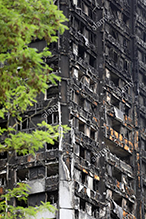Fire safety costs and leaseholders
- Details
 Zishaan Saleem reports on the first tribunal ruling on cladding and fire safety measures in the aftermath of the Grenfell Tower fire.
Zishaan Saleem reports on the first tribunal ruling on cladding and fire safety measures in the aftermath of the Grenfell Tower fire.
In all the action to remove defective cladding, leaseholders have been the elephant in the room. Whilst social landlords might have adopted a wait and see approach private landlords do not have that luxury.
January 2018 saw the first decision by the First Tier Tribunal Property Chamber (‘FTT’) concerning cladding and fire safety measures post-Grenfell. The case of E&J Ground Rent No 11 LLP v Various Leaseholders of Fresh Apartments MAN/00BR/LSC/2017/0068 considered whether the costs of implementing fire safety measures (in this case, providing fire marshals for a ‘Waking Watch’ at the block of apartments) were recoverable from the block’s leaseholders.
E&J implemented these measures further to findings that the cladding to the block was high-risk, and needed removing. The leaseholders disputed the E&J’s claim that it had no alternative but to deploy a Waking Watch as a fire safety measure pending the removal of the cladding, and most notably contested whether the associated costs were recoverable from them within their service charge.
An action plan drawn up by the Greater Manchester Fire and Rescue Service directed E&J to take steps to comply with the Regulatory Reform (Fire Safety) Order 2005 by ensuring that ‘a reliable fire detection system’ is in place. The FTT found that the Waking Watch measure was in compliance with E&J’s statutory obligations under the 2005 Order, and was also in compliance with DCLG guidance. The parties to the matter did not raise any viable alternative actions, and the FTT noted that it was difficult to identify any other practical steps that could have been immediately implemented. Had E&J failed to act, it would have risked breaching both statutory obligations and the insurance policy.
In respect of liability for the costs of the measures taken by E&J, it was decided by the FTT that they were recoverable from the leaseholders under clauses of the lease which provided for costs in relation to the lessor’s compliance ‘with the requirements and directions of any competent authority and with the provisions of all statutes, regulation orders and by-laws made thereunder relating to the Building’. Costs of insurance were also recoverable from the leaseholders in accordance with the lease.
Having confirmed that E&J were entitled to both implement a ‘Waking Watch’ pending the removal of the building’s external cladding and recover the costs of doing so from the leaseholders, the FTT declined to make an Order under Section 20C of the Landlord and Tenant Act 1985, and so the costs of the application itself were also recoverable under the lease.
Whilst this decision confirms that fire safety costs can be recovered from leaseholders by way of service charges, the applicability of this outcome to other cases going forward will depend upon the specific wording of leases. In the E&J case, the FTT found that the leases provided for the recovery of such costs from the leaseholders.
However, the key learning point from this case is that (as ever), if there are contentious items of expenditure, especially when recovery is going to be difficult and might be challenged at the Tribunal, it is best for landlords to be proactive. What is especially reassuring is that the costs of the application were (here) charged to the service charge account, not an expense borne by the landlord – as always check the lease wording. Parties can expect scrutinisation of leases in cases of similar issue, and so it is advisable to check the contents of their leases when looking to ascertain where costs for fire safety measures can be recovered through service charges.
In this case, the FTT did not consider the issue of liability for replacing the Property’s external cladding; this will be considered at a later date, if relevant. It is likely that this issue will be decided shortly in an unrelated case.
Zishaan Saleem is a housing management solicitor at Anthony Collins Solicitors. He can be contacted on 0121 214 3616 or
Sponsored articles
Unlocking legal talent
Walker Morris supports Tower Hamlets Council in first known Remediation Contribution Order application issued by local authority
Legal Director - Government and Public Sector
Lawyer (Planning and Regulatory)
Contracts Lawyer
Locums
Poll









































